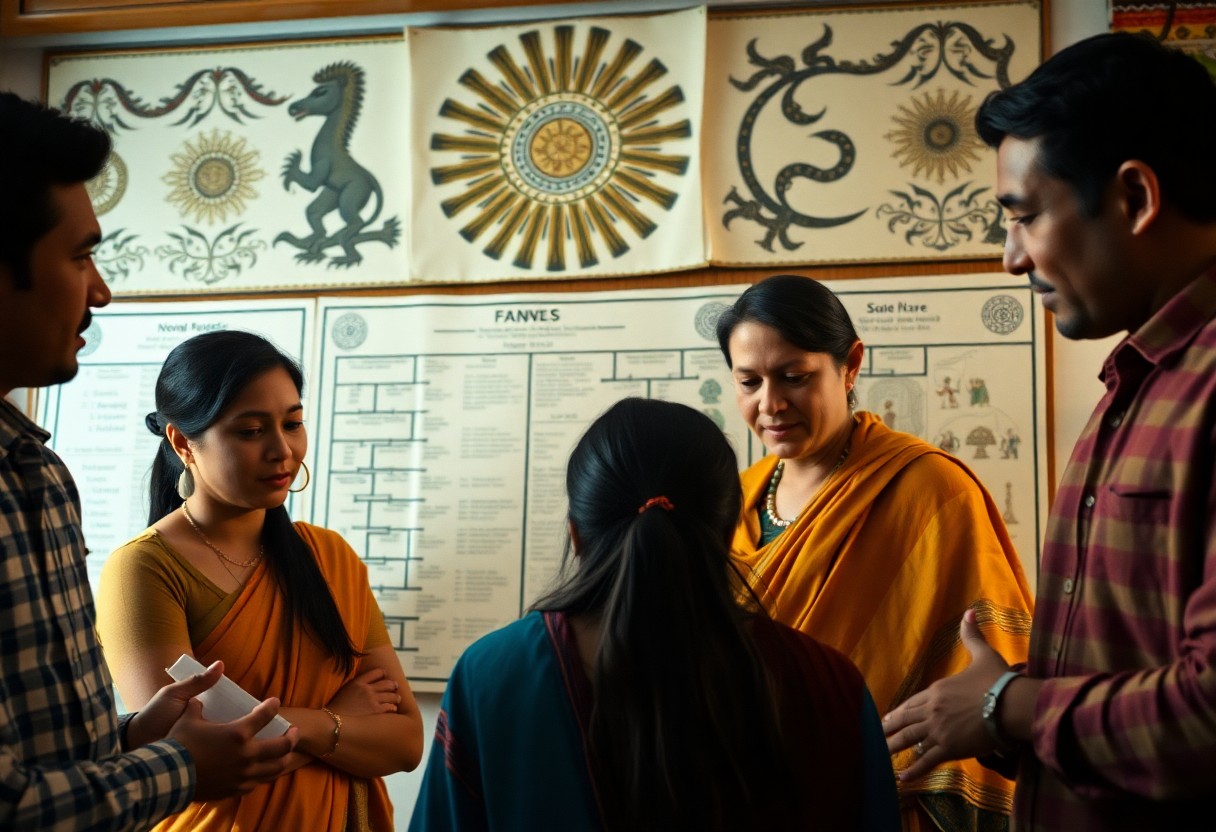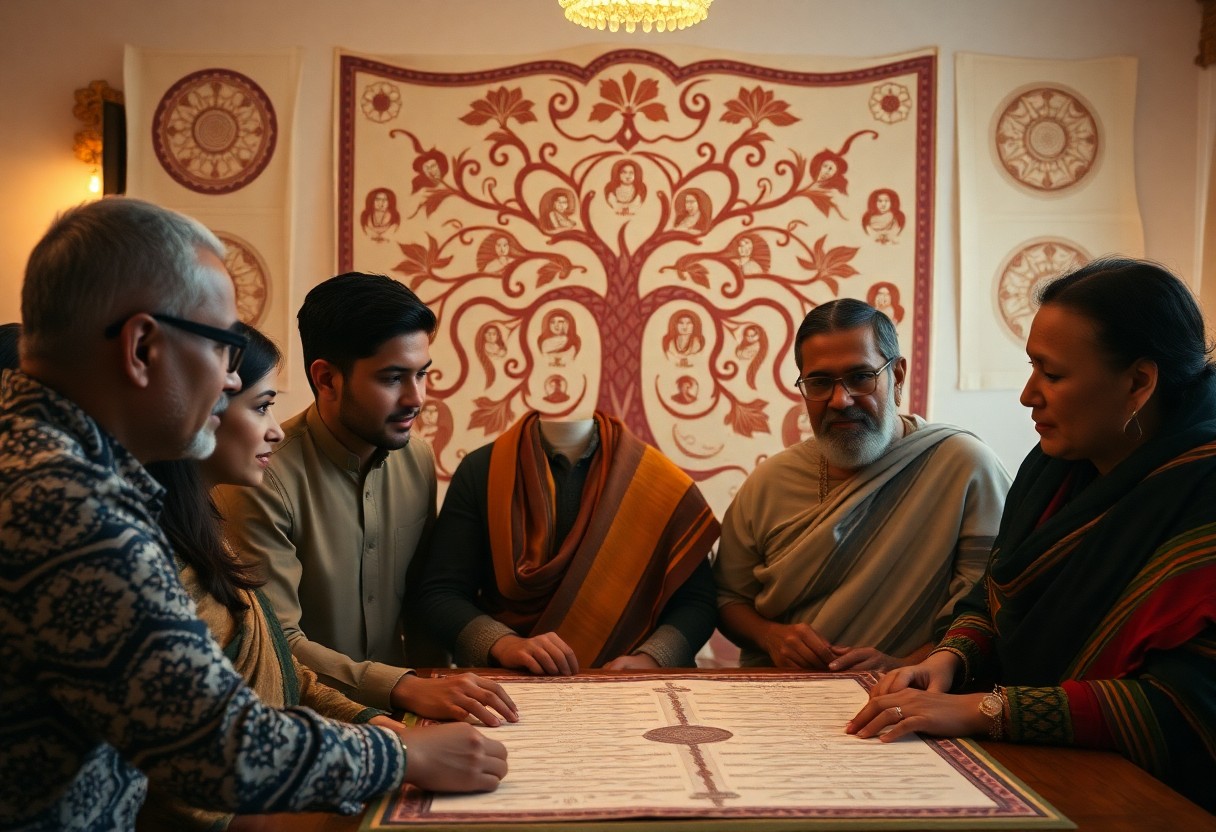Over time, understanding your gotra can deepen your connection to your heritage and inform important personal decisions, such as marriage. This guide will help you identify your ancestral lineage, which is vital in many cultures for social and spiritual reasons. You will explore various methods, from consulting family elders to examining historical records. Each step is designed to enhance your knowledge of your family’s background and the significance of gotra in your life, ensuring you can navigate relationships with confidence and respect for your traditions.
Table of Contents

Key Takeaways:
- Family Tree Research: Begin by exploring your family tree to trace back your lineage and identify your ancestors, which can provide insights into your gotra.
- Consulting Elders: Engage with family elders who maintain knowledge about your family’s history and traditions, as they can often share valuable information about your gotra.
- Community Resources: Look into community resources, such as caste or ethnic organizations, that may offer guidance and documentation regarding your gotra.
Understanding Gotra
While exploring your cultural heritage, understanding the concept of gotra becomes vital. It signifies your ancestral lineage and plays a significant role in determining your relationship with others in your community. Knowledge of your gotra helps maintain the social fabric by influencing marriage choices and familial relationships. Engaging with your gotra can offer insights into your identity and the values that have been passed down through generations.
Definition of Gotra
There’s a foundational principle behind gotra that stems from the Vedic tradition of ancient India, mainly identifying different clans or lineages. Each gotra is typically associated with a revered sage or ancestor, making your connection to your ancestry significant. It serves not only as a marker of identity but also as a means to preserve cultural values.
Historical Significance
The gotra system has played a pivotal role in social organization within Hindu communities throughout history. It has functioned as a method for establishing kinship, allowing people to identify their familial ties across generations. This lineage system has historically helped in avoiding marital conflicts by prohibiting marriages within the same gotra, promoting genetic diversity, and fostering community bonds.
Historical analysis shows that the gotra system has been integral not just as a marker of identity but also in governing social interactions. It has provided a sense of belonging to individuals while facilitating a social structure that emphasized unity and cooperation among clans. Over time, as societies evolved, these connections became a means of not only preserving cultural identity but also of maintaining harmony within larger community frameworks. Understanding your gotra therefore enriches your awareness of your heritage and community ties.
How to Determine Your Gotra
Assuming you are eager to uncover your gotra, the first step is to trace your lineage. This process involves exploring your family history and understanding the ancestral roots that define your gotra, which is linked to the ancient sages in Hindu tradition.
Family Lineage
Your family lineage serves as a foundational aspect in identifying your gotra. Begin by collecting information from older family members, documenting the names and connections of your ancestors, which may reveal your specific gotra.
Consultation with Elders
Now, reaching out to family elders is an important step in your search for your gotra. Engaging with these knowledgeable individuals can provide insights that may not be found in written records.
It is beneficial to have detailed conversations with your family elders, as they possess valuable oral traditions and stories that could illuminate your family’s history. Their memories might hold the key to understanding your gotra, and the more you inquire, the clearer your ancestral connections will become. Do not overlook this valuable resource; knowledgeable elders often have insights that documentation might miss, ensuring you gain a comprehensive understanding of your heritage.
Factors Influencing Gotra
Unlike most systems of ancestry, your gotra derives from several significant influences. Key elements include:
- Lineage – tracing your ancestry to the original sage.
- Community – your specific social grouping’s norms.
- Geographical location – your region can determine distinct practices.
Knowing your gotra helps you appreciate the deep roots of your heritage.
Regional Differences
Now, the gotra system varies significantly across regions. Different areas have unique ancestral traditions, and your local customs might influence which gotra categories are recognized. Exploring these local distinctions can provide greater insight into your heritage.
Community Practices
For many, community practices play a vital role in identifying your gotra. These practices often include rituals, festivals, and family traditions that are passed down through generations, influencing how you connect with your ancestry.
The significance of community practices cannot be overstated. They serve not only to strengthen your family ties but also enforce social norms related to gotra. Many communities uphold strict marriage guidelines based on gotra affiliations to prevent intermarriage among close relatives. Engaging with these customs allows you to find your place within the community and understand your family history. Additionally, participating in traditional ceremonies fosters a sense of belonging while highlighting the importance of cultural identity.

Tips for Accurately Identifying Your Gotra
Now that you are set to explore your origins, consider these tips for accurately identifying your gotra:
- Consult your family members about your ancestry.
- Keep records of family traditions and lineage.
- Check historical documents for references to your gotra.
This process can lead to enlightening discoveries about your heritage.
Researching Family History
Clearly, submerging into your family history can unveil significant details. Start with oral histories from grandparents and parents, as they often hold crucial knowledge about your family legacy. Additionally, examine family documents, old letters, and photographs that could reveal names or places associated with your gotra.
Utilizing Online Resources
There’s a wealth of information available online that can aid you in your gotra inquiry. Several websites and databases focus on family trees, providing access to records that might include your gotra. Forums and social media groups dedicated to genealogy can also offer valuable insights.
For instance, many websites like Ancestry.com and FamilySearch offer user-friendly platforms where you can build your family tree, upload documents, and even connect with distant relatives. You can find historical records such as census data, birth certificates, and marriage licenses that may contain mentions of your gotra. Furthermore, engaging with online communities can help you exchange information and experiences with others on a similar quest, enhancing your research experience. Always ensure you verify the credibility of the sources for accurate identification.
Common Mistakes to Avoid
Despite your best efforts, it’s easy to make mistakes while trying to determine your gotra. To ensure you’re on the right track, steer clear of relying solely on assumptions or hearsay, and focus on gathering accurate information from trustworthy sources. Being aware of these pitfalls can save you time and help you uncover your true lineage effectively.
Misinterpretation of Information
Any ambiguity in the information you receive can lead to incorrect conclusions about your gotra. Be cautious of differing opinions and anecdotes; always cross-verify details with reliable sources or consult with knowledgeable family elders who can provide clarity.
Generalizations Across Communities
Some individuals mistakenly assume that gotra systems are identical across all communities, leading to misconceptions about their own lineage. Different cultural and regional factors can influence the gotra system, so it’s crucial to be aware of these distinctions.
Understanding that each community has its own unique gotra practices is vital. This means that your family’s lineage may not align with broader trends you observe in other groups. Focus on uncovering your individual history, as generalizations can lead to confusion and misinterpretation of your true heritage. Engaging with community members or trusted leaders can help you navigate these complexities and affirm your identity.
Seeking Expert Guidance
For many, uncovering their gotra can be complex. Seeking expert guidance can significantly enhance your understanding. By consulting with knowledgeable individuals, you can obtain accurate information about your family lineage and heritage, ensuring that your journey is informed and respectful of your traditions.
Engaging with Genealogists
On your quest to discover your gotra, engaging with genealogists can prove beneficial. These professionals specialize in tracing family histories and can offer insights based on extensive research and records, allowing you to gain a deeper understanding of your ancestral roots.
Religious and Cultural Organizations
The exploration of your gotra can also be enriched by connecting with religious and cultural organizations. These groups often hold significant knowledge about community lineages and traditions, providing you with resources and connections that can ease your search.
Engaging with religious and cultural organizations not only connects you with your heritage but also places you within a community that values shared ancestry. Organizations often have access to a wealth of historical records and knowledgeable members who can assist in identifying your gotra. Through participation in events and discussions, you can gather insights that further illuminate your lineage, making the process both enlightening and community-oriented.
Final Words
Considering all points, knowing your gotra is crucial for understanding your ancestral lineage and the customs associated with it. You can trace your gotra by researching your family history and understanding the significance of the seven sages. Additionally, engaging with family elders or consulting with experts can provide clarity. For more insights, check out What is Gotra? Based on the names of seven sages, know …. This knowledge will help you maintain social and familial harmony in your community.
FAQ
Q: What is gotra and why is it important?
A: Gotra refers to a lineage or clan system traditionally associated with families in Hindu culture. It indicates the ancestry of a person and plays an important role in marriage arrangements and religious practices. Gotra is derived from the name of an ancient sage and denotes the paternal lineage. Knowing your gotra can help identify familial connections and avoid inter-clan marriages, which are often considered unfavorable in Hindu practices.
Q: How can I find out what my gotra is?
A: To determine your gotra, begin by investigating your family history. Ask your parents or elders about your paternal lineage, as gotra is typically passed down through the male line. You can also explore family records or consult with relatives who may have a deeper understanding of your ancestral background. Additionally, certain Hindu communities maintain registers or clan lists that detail gotras, which can be beneficial for verification.
Q: Are there online resources to help identify my gotra?
A: Yes, several online resources and forums can assist you in identifying your gotra. Websites dedicated to genealogy and family trees may provide insights into your ancestry. You can also explore online communities or social media groups focused on your specific caste or region, where members often share information about their gotras. However, it is important to cross-verify any information gathered online with family knowledge to ensure its accuracy.